Auto Blackberry Kush Cannabis Strain Week-by-Week Guide
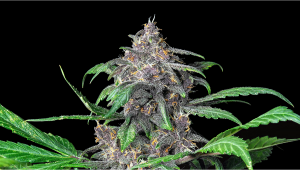
- 1. Grow specifications
- 2. Grow set up
- 3. Germination and seedling stage | week 1
- 4. Early veg | week 2
- 5. Mid veg | weeks 3-4
- 6. Transition (pre-flower) | week 5
- 7. Early flower | weeks 6-7
- 8. Mid flower (bulk phase) | weeks 8-9
- 9. Ripening and harvest | week 10 (and beyond)
- 10. Yield and smoke report
- 11. In conclusion
Auto Blackberry Kush is a standout strain renowned for its captivating qualities. For growers, it's a dream come true with XL-sized yields in just 10 weeks, featuring visually stunning purple resinous buds and a complex aroma blending fruity, earthy, and piney notes. Its adaptability to changing temperatures allows for vibrant purples, adding to its allure.
Smokers can savor a relaxing, body-centric high with a gradual transition from euphoria to deep relaxation, perfect for evening unwinding. Auto Blackberry Kush is a must-try for its exceptional aesthetics, aroma, and soothing effects, making it a standout choice in the cannabis world.
1. Grow Specifications
Auto Blackberry Kush boasts a rapid 10-week seed-to-harvest cycle, ensuring a swift turnaround for harvest. Growers can anticipate XL-sized yields, with the potential for around 400-450 g/m² in controlled indoor settings. However, seasoned professionals using hydro or coco setups may achieve even higher yields, exceeding half a kilogram per plant. Outdoors, it typically produces between 50-100 grams per plant, ideally during the sunniest and driest summer months to avoid excessive humidity that can affect compact bud development.
Consumers can expect a delightful experience when using Auto Blackberry Kush. It offers a robust, complex terpene profile, dominated by terpinolene, pinene, limonene, caryophyllene, and myrcene, along with other terpenes like linalool, humulene, ocimene, camphene, and eucalyptol. This results in a multifaceted flavor and aroma characterized by fruity, earthy, and pine-like notes with a subtle diesel undertone. When smoked, it provides a strong and lasting body stone, transitioning from euphoria to deep relaxation. It's an ideal choice for evening use and can even induce a couch-lock effect, promoting a restful night's sleep.
2. Grow Set Up
To grow Auto Blackberry Kush, you don't really need any special knowledge or a lot of experience. However, if you want to read up on the art of cultivating the strain, there's no shortage of grow diaries available online. We have chosen just two of them, which are detailed enough and have many nicely shot pictures. In the table below, you can find the data for one of those two grows.
| Grow Space: | 1 m2 (10.76 ft2) | Pot Size: | 12 l (3.17 gal) |
|---|---|---|---|
| Seed to Harvest: | 10 weeks | Medium: | Coco/Perlite |
| Flowering: | 5 weeks | TDS: | 300-800 |
| Light Cycle: | 18/6 | pH Levels: | 6.0 |
| Light Type: | LED | Day Temperature: | 24°C (75°F) |
| Watts Used: | 450 | Humidity: | 60% |
Naturally, you don't need to create the exact same setup in your home garden. Auto Blackberry Kush is versatile enough to flourish in a lot of conditions, both indoors and outdoors.
3. Germination And Seedling Stage | Week 1
The most important thing an indoor grower should do is to establish and maintain consistent environmental conditions in the grow room. The most important thing is, of course, temperature. Aim at around 25°C in the day with a 5-10° drop during the night. The relative humidity is also essential. For a successful grow, it should be from 40 to 60%.
| Day Temp: | 24°C | Plant Height: | 15 cm |
|---|---|---|---|
| Night Temp: | 18°C | pH: | 6.0 |
| Humidity: | 60% | TDS: | 300 ppm |
There are a lot of methods for easy and successful cannabis seed germination. The most straightforward one is to place the seeds between moist paper towels and keep them there until they crack and show the taproot. This usually happens in 1-2 days. Don't rush to put the sprouted seeds into the medium right away. Our previous experience has shown us that the most viable seedlings are those that were planted when the taproot had reached at least half an inch (1 cm) while still in the wet paper towels.
When you think that you're finally ready to plant your seeds, you can choose from a variety of mediums. One of the easiest methods is to plant your cannabis straight into the final pot. However, some people use jiffy tablets and plugs, solo cups filled with soil, and rockwool cubes. Rockwell cubes are especially well-adapted for hydroponic cultivation.
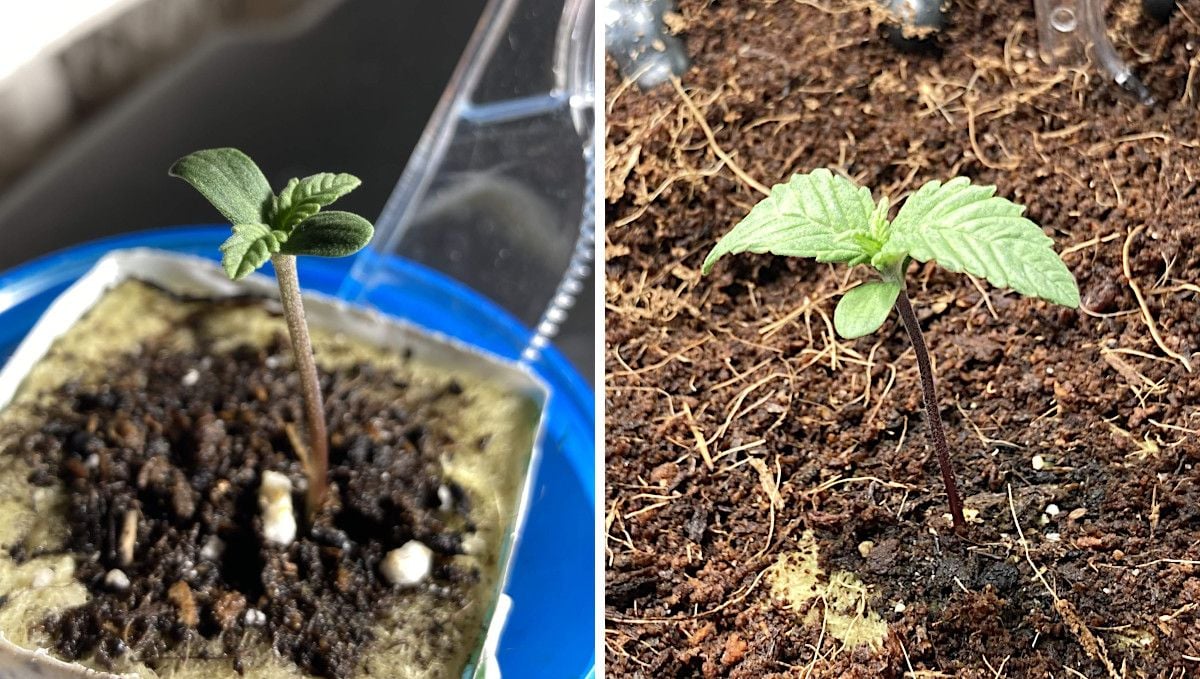
You don't really have to turn on the lights before the sprouts have come up. However, once they do, you'll need to turn on the lights and keep them on for at least 18 hours a day. For autoflowers, including Auto Blackberry Kush, you can also choose a 24/0 light schedule for the whole of the vegetative phase.
Make sure that lights are close enough so that they do not cause the seedlings' excessive stretching. At the same time, the lights shouldn't be too close, or else they may stunt the seedling with too much energy, and it will keep close to the ground and develop slowly. Try to avoid that.
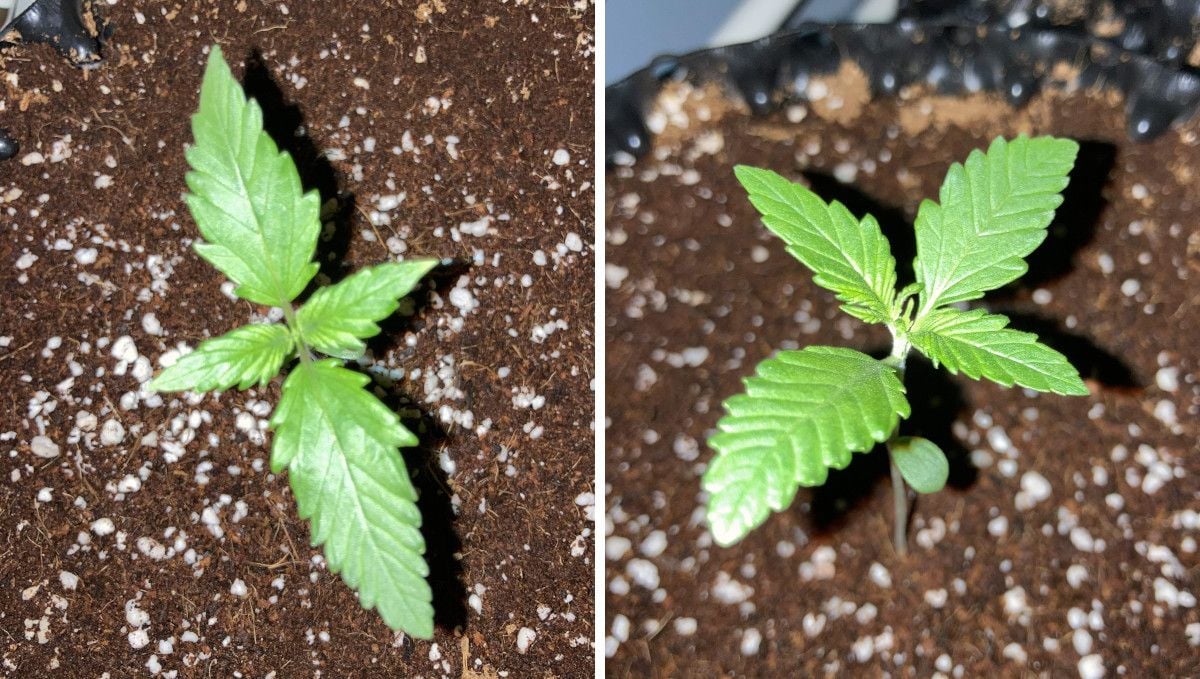
In most cases, you'll only need to provide pure water to your young cannabis plants in the first week. Nutrients will come later. Only if your grow hydroponically or in coco coir, will you need to give your plans extra nutrients practically from day one.
4. Early Veg | Week 2
Maintaining stable and consistent conditions is key to the success of weed cultivation indoors. However, slight variation in your environment will also help. As your seedling grows and becomes more robust, you can gradually lower the day temperature and the relative humidity.
| Day Temp: | 24°C | Plant Height: | 15 cm |
|---|---|---|---|
| Night Temp: | 18°C | pH: | 6.0 |
| Humidity: | 60% | TDS: | 300 ppm |
In the second week from seeds, Auto Blackberry Kush will grow considerably faster than before, and you will see new leaves and even little side branches appear every day.
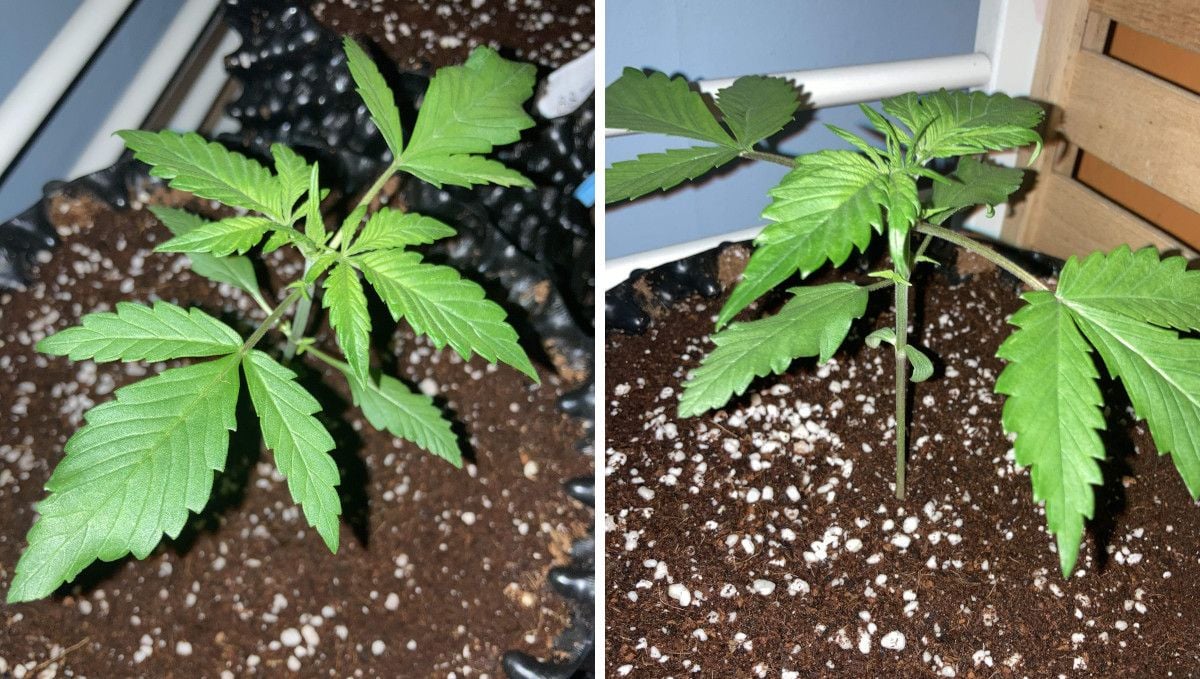
If you grow in soil and have a large pot with a lot of nutrient-rich medium, you won't have to worry about feeding your plans just yet. Pure water will be enough and will ensure rapid growth. However, some people start experimenting with small doses of nutrients starting from the second or even the first week. You can do that too, but always remember to start low and slow as overfeeding, as well as overwatering, are the most common and impactful mistakes that a novice grower can make.
Below, you can find a sample nutrient schedule for the whole Auto Blackberry Kush grow cycle. As you can see, the gardener started with feeding early on, but he also used very small dosages of nutrient -- it's obvious by the low TDS readings in the first week.
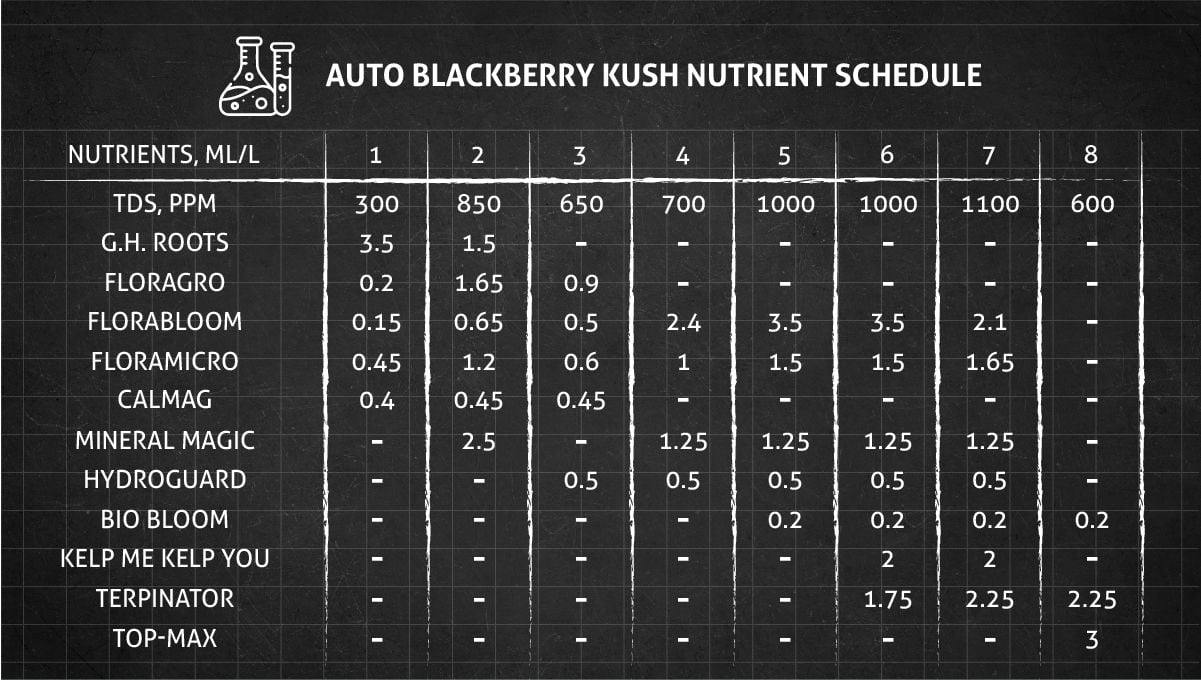
In one of the grows that we've been following, the gardener used two different mediums – soil and coco coir – for the same autoflower. Usually, coco ensures more rapid growth, but you have to dial in the watering and feeding regimen just perfectly. If you fail to do that – and that happens to many beginners – you'll probably face more challenges and issues than if you had chosen soil. In this case, Auto Blackberry Kush grew more vigorously in soil.
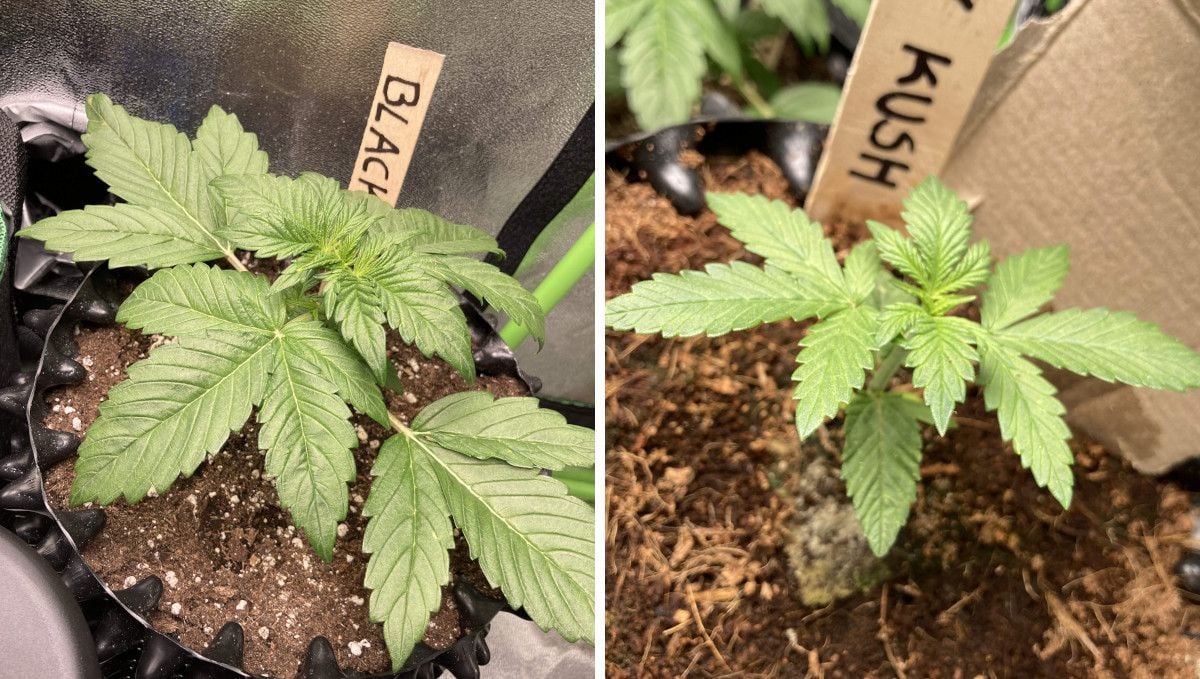
5. Mid Veg | Weeks 3-4
In the second half of the first month, your young plant isn't a seedling anymore. It's strong enough to withstand a wider range of conditions than before. For you, this means that you can focus less on maintaining ideal conditions and pay more attention to other aspects of cultivation. Both the day temperature and the relative humidity can be lowered now compared to the previous weeks.
| Day Temp: | 24°C | Plant Height: | 15-25 cm |
|---|---|---|---|
| Night Temp: | 18°C | pH: | 6.0 |
| Humidity: | 60% | TDS: | 600 ppm |
Weeks three and four mark the time when the vegetative growth starts for real. You will see new leaves and branches develop literally overnight. For bigger and bushier plants, we'd recommend starting to train about now. However, Auto Blackberry Kush is a strain that's relatively short and compact, so the gardeners that we've been following decided not to train their plants. They just let them grow naturally, and they stayed quiet low-profile till the end.
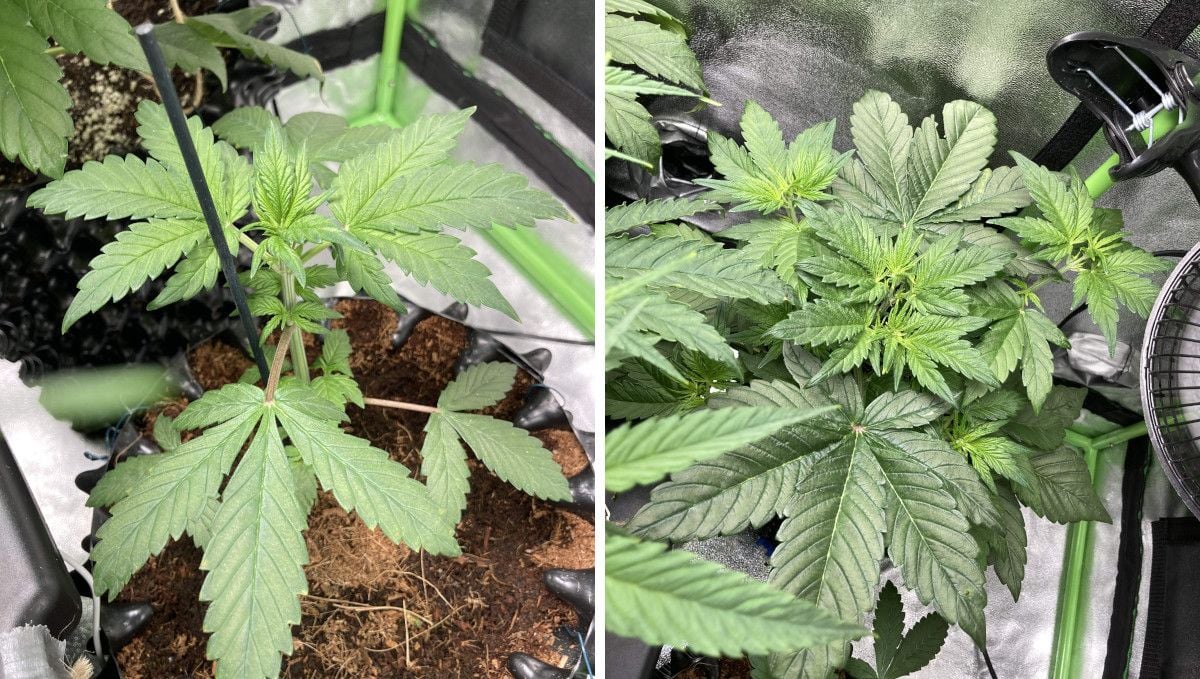
Since you won't be too busy with training, perhaps you should focus on such important aspects of cannabis cultivation as proper watering and feeding. Make sure you give your plants plant food rich in nitrogen because it is nitrogen that is the most important for the formation of branches and foliage. You should also establish a proper watering schedule – when you water just the right amount and not too often. Cannabis hates overwatering and reacts with clawing leaves when it's constantly soggy in the root zone (as you can see in the picture below).
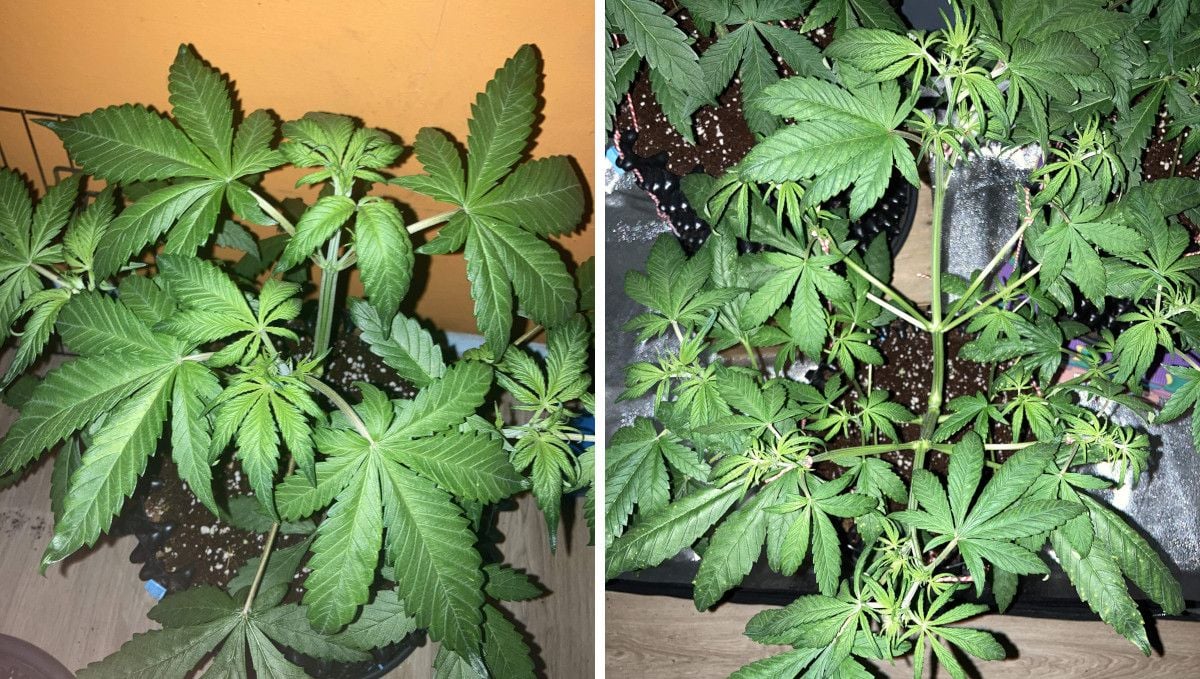
6. Transition (Pre-Flower) | Week 5
When the flowering starts or is about to start, it's time for you to start thinking about changing the growing condition slightly. Flowering plants require a bit lower temperatures, especially during the day. More importantly, the relative humidity should be lowered as the plants stack up and fill out their buds. This will prevent issues with fungal infections down the road.
| Day Temp: | 24°C | Plant Height: | 25 cm |
|---|---|---|---|
| Night Temp: | 18°C | pH: | 6.0 |
| Humidity: | 60% | TDS: | 600 ppm |
For most autoflowers, including Auto Blackberry Kush, week 5 is the time when things start to get interesting. If you are attentive enough and look deep inside the canopy, you will see the first pre-flowers appear at the nodes. By nodes we mean the places where the leaf stalks attach to the stem or a branch. It's usually at the middle nodes that the first flowers appear. For female plants, they look like little onions from which two long hairs stick out.
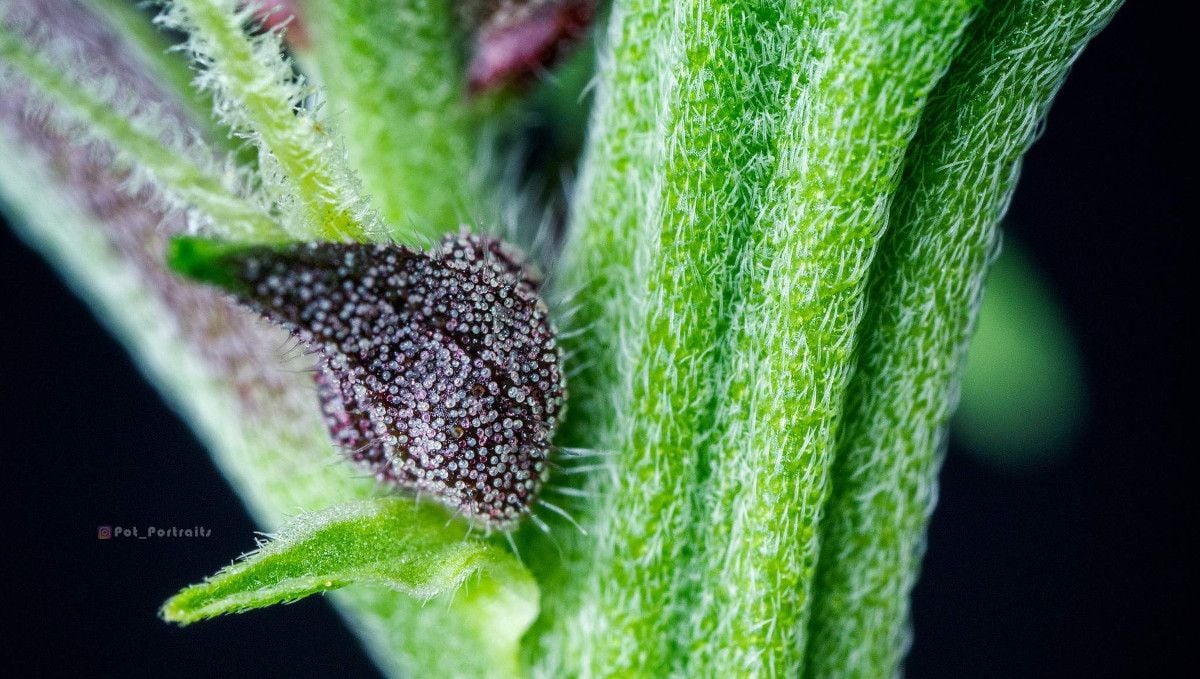
The plant tops start to change too but that happens a little bit later. First, the shape of the leaves at the tops changes. They become very thin, curvy, sometimes even threadlike. Less experienced gardeners may think that these are not leaves but little hairs similar to those that they have seen at the middle nodes. However, it is not quite true – the hairs will appear here too but a little bit later, making the tops fluffy.
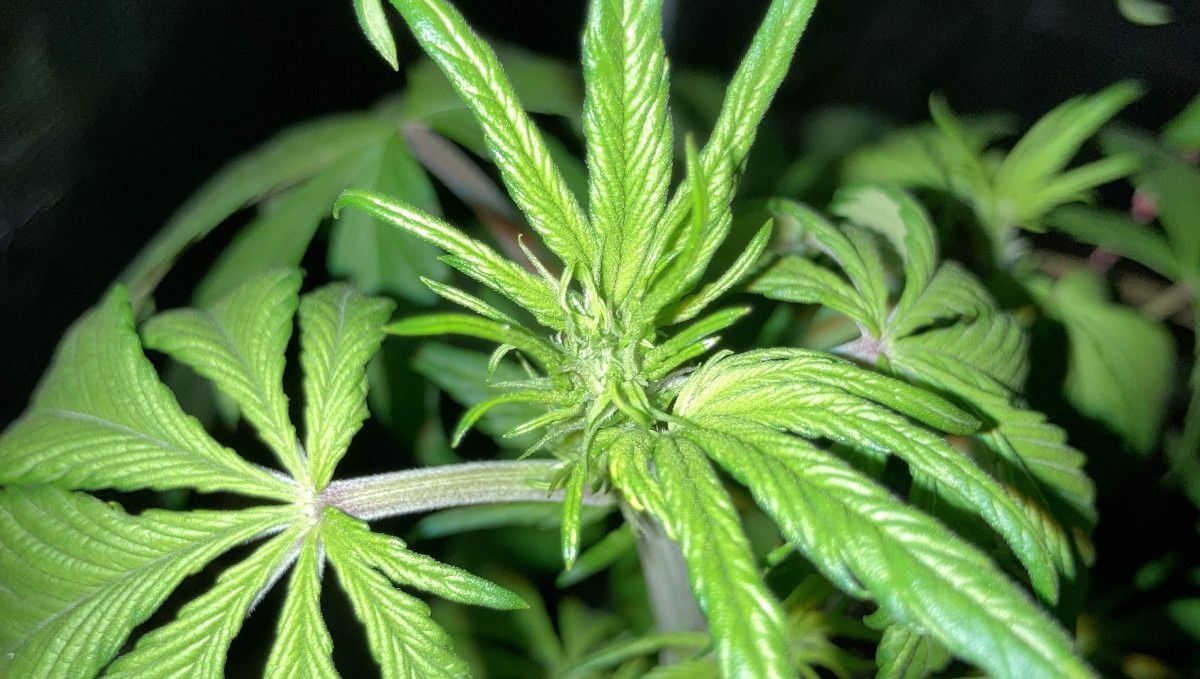
As you see the first signs of your plant's transitioning to flowering, it will also start to stretch. The flowering stretch is more pronounced in some strains and less pronounced in others. More stretchy cultivars may gain about 100% or more in height during the first weeks or the flowering stage. Auto Blackberry Kush is more manageable in this respect and doesn't stretch too much.
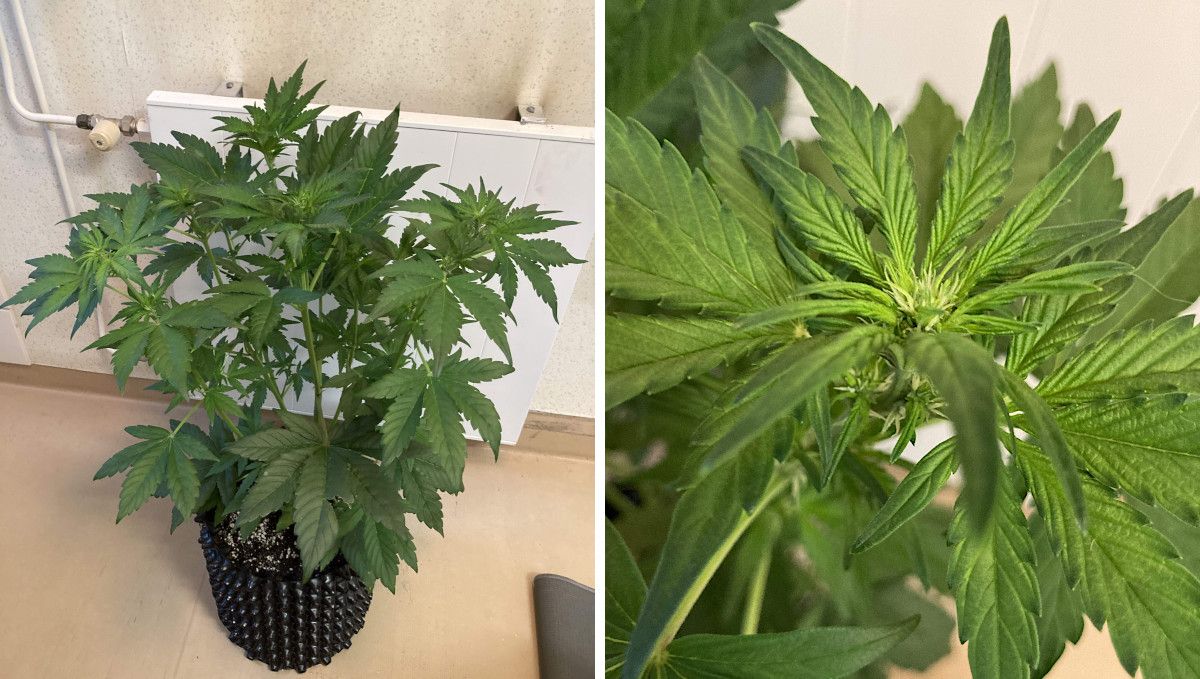
7. Early Flower | Weeks 6-7
As the plants and their flowers grow, you will need to provide more and more plant food to cope with their increased appetite. Look at the table below, and you will see how the gardener increased the TDS readings from 600 to 800 ppm. It's not too much as cannabis goes, but autoflowers aren't as hungry as photoperiod varieties.
| Day Temp: | 24°C | Plant Height: | 25-50 cm |
|---|---|---|---|
| Night Temp: | 18°C | pH: | 6.0 |
| Humidity: | 60% | TDS: | 600-800 cm |
While you'll need to provide a stronger nutrient solution for your plants now, you will also have to change the fertilizers that you give them. Before, it was mostly nitrogen, but now it will only play the second fiddle, as the most important macronutrients during flowering are phosphorus and potassium.
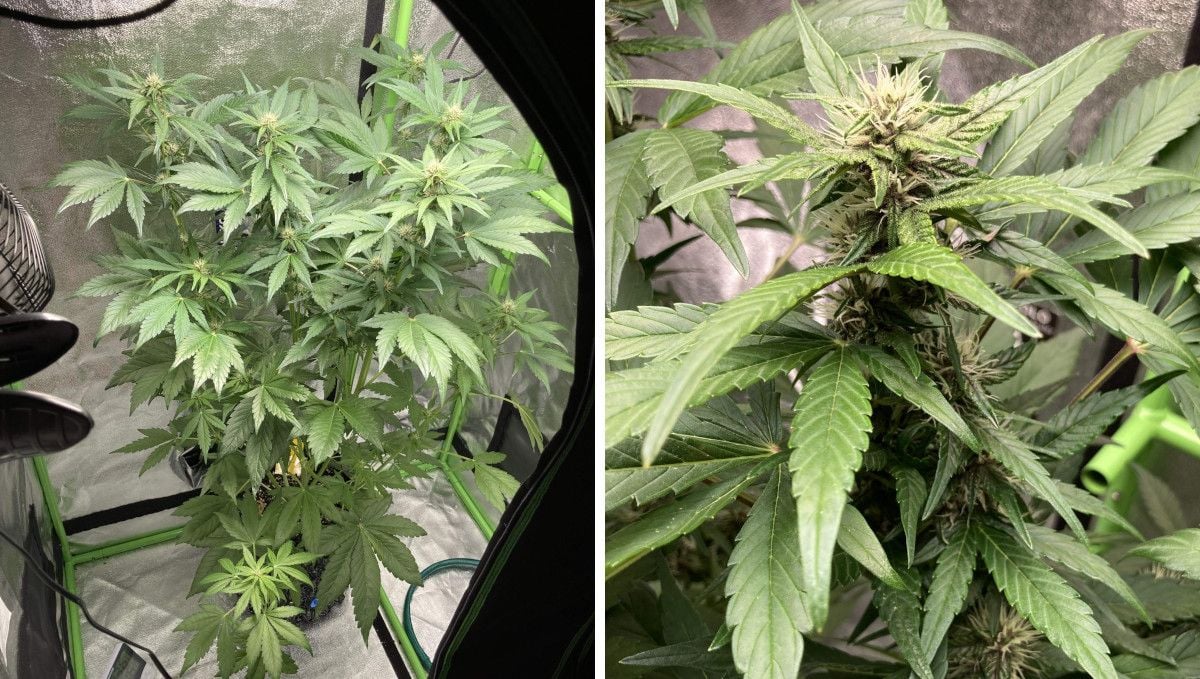
You'll have to pay close attention to the distance between the plant tops and the light. The reason is that the plants will stretch and grow into the light, sometimes getting dangerously close. While cannabis loves bright light, there can be too much of it, even to the point of causing light burn.
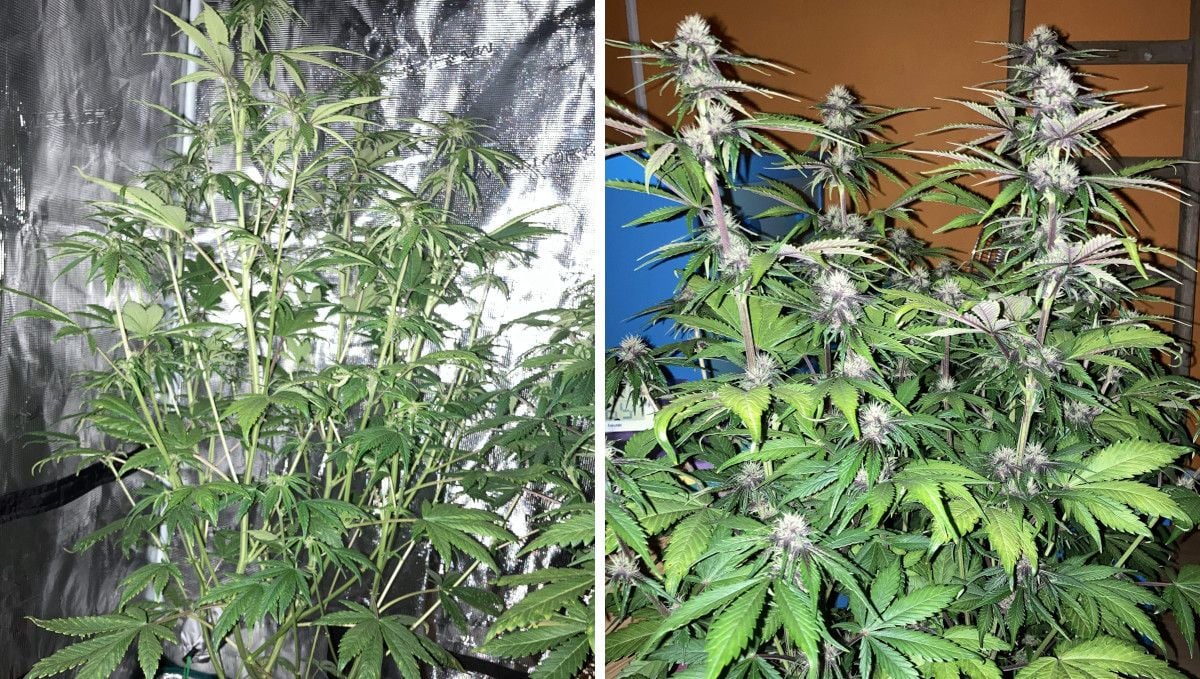
The stretch can be a nightmare for those growers who have very limited vertical space in their grow room. However, Auto Blackberry Kush doesn't grow too big, and you aren't likely to experience any issues with your plants overgrowing the available space. And besides, autoflowers usually stop to stretch by week 8. Look at the graphic below to see how the two Auto Blackberry Kush plants were gaining height throughout their life cycle.
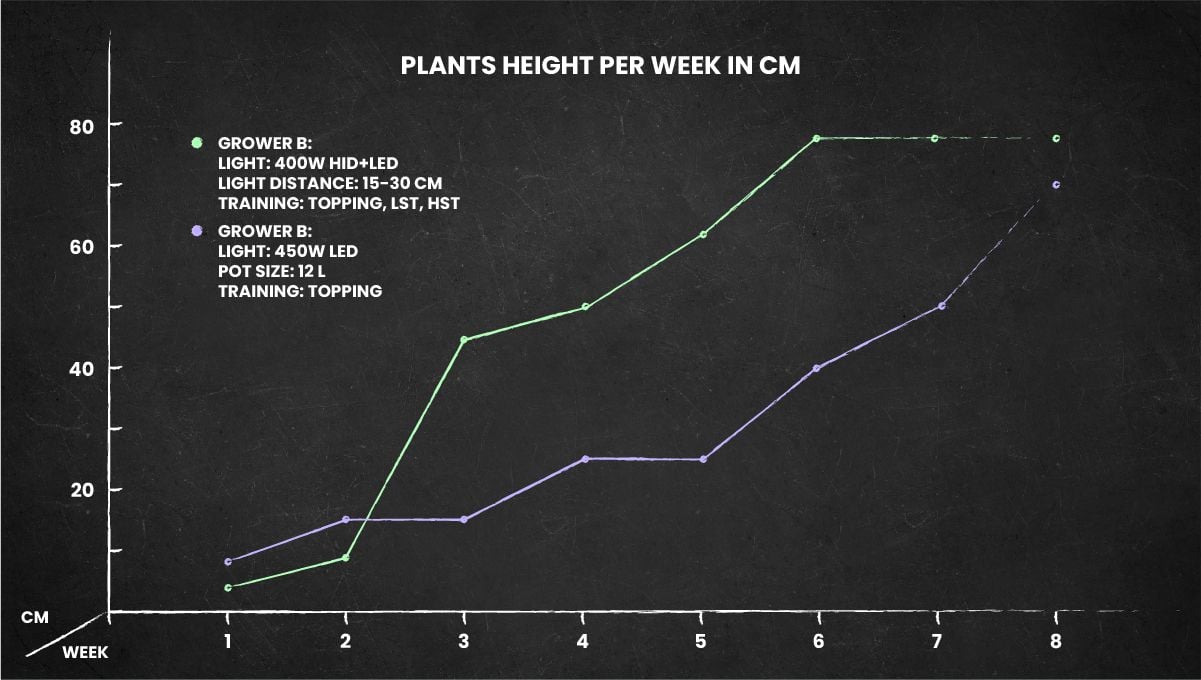
Of course, the vertical growth isn't the only thing that's happening to your plants during this time. The more important development is the growing of the flowers that start to form long continuous colas that we appreciate so much. The buds and the little leaves sticking out from them also start to get sticky as they get covered in trichomes, resin glands that contain the bulk of THC and terpenes.
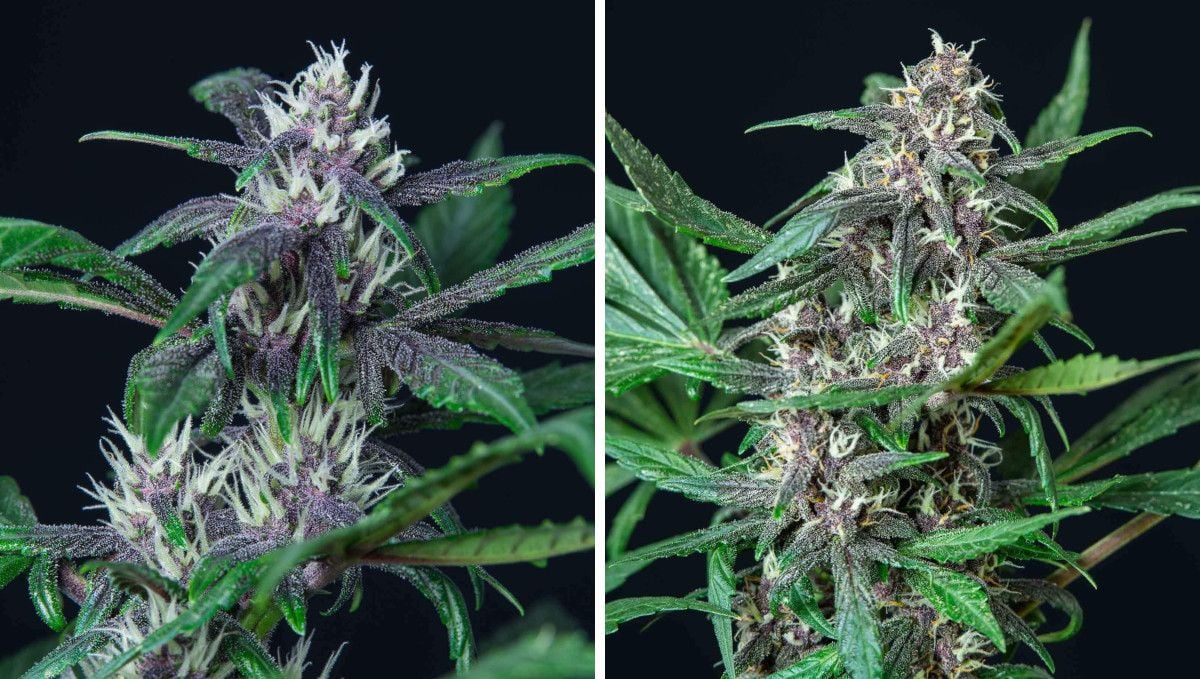
The strains that have a genetic predisposition to become purple, reveal this exotic coloration on their own. Other strains that have less purple genes in them may require special conditions for that. The most important of those conditions is the lower temperatures, especially during the nights.
8. Mid Flower (Bulk Phase) | Weeks 8-9
As your Blackberry Kush autoflower starts to bulk up, pay extra attention to keeping the relative humidity readings within an optimal range between 35 and 45%. This way you will save your precious buds from extra risks of developing some really nasty fungal infection, such as mold, bud rot, and powdery mildew. The 60% that you see in the table below is probably too much.
| Day Temp: | 24°C | Plant Height: | 70 cm |
|---|---|---|---|
| Night Temp: | 18°C | pH: | 6.0 |
| Humidity: | 60% | TDS: | 800 ppm |
The late flowering phase is hands down the most uneventful time in the whole life cycle of your autoflower. You won't need to work with the canopy, worry about the stretching and the correct placing of the lights, and you'll probably have long figured out the perfect watering and feeding schedule by now. Now, it's time to sit back and just watch the flowers fill out.
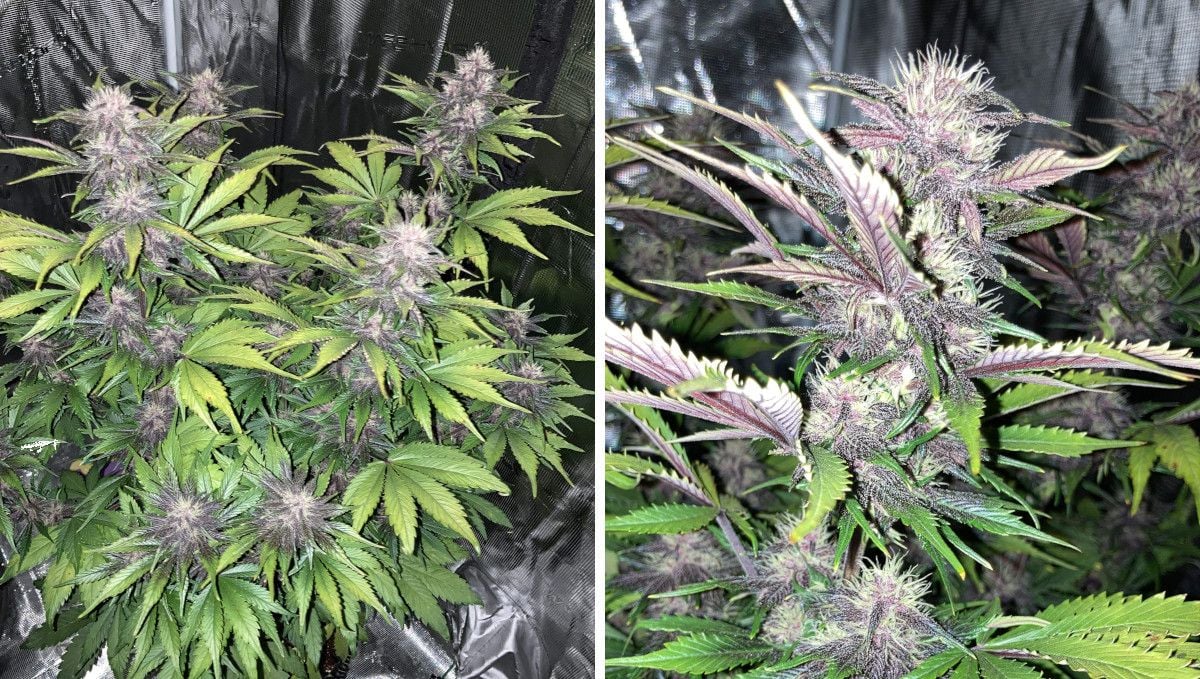
Even if you provide your plants the exact nutrients that it needs at this stage, be prepared to see a lot of discolorations on your leaves. It's too late in the day to worry about some small deficiencies as harvest is just around the corner, and one particular deficiency (nitrogen deficiency) is even beneficial as it prepares your plant for the coming harvest. The N-deficient plants start to yellow from the bottom up, and it's perfectly okay in the final weeks of your autoflower's life cycle.

As far the feeding is concerned, we'd recommend using a formula rich in phosphorus and potassium (P and K) and maybe even using a standalone PK-booster -- a lot of nutrient manufacturers offer them. High doses of these two macronutrients really makes a difference in terms of the size and density of the buds.
9. Ripening And Harvest | Week 10 (And Beyond)
While watching the relative humidity in the final few weeks remains of utmost importance (remember to keep it between 35-45%), the perfectionists among you may also try to lower the day temperatures to something like 23°C or even lower to emulate autumn weather. Just don't go overboard with too low night temperatures - this may increase the risk of mold. A 5-degree drop for the night will be the safest bet; a 10-degree drop is the maximum of what you can try safely.
| Day Temp: | 24°C | Plant Height: | 70 cm |
|---|---|---|---|
| Night Temp: | 18°C | pH: | 6.0 |
| Humidity: | 60% | TDS: | 800 ppm |
During the final weeks, it is of utmost importance to inspect your plants daily so that you don't miss the perfect window to start you pre-harvest preparations. There are a lot of "rules of thumb" that will help you understand that your weed's life cycle is almost over. The first of sign of approaching maturity is that the buds stop getting fatter (but they still become denser though it's harder to ascertain visually).

The second thing to look for is the color of pistils -- those little hairs that cover female buds. They start out as greenish-white, but later begin to wither one by one starting from the top. In most strains, they get brown, but in exotic-looking varieties, such as Auto Blackberry Kush, they may become purple, red, or even pink.
However, the only reliable way of making sure your buds are ready to be harvested is to inspect the trichomes through a hand microscope. Trichomes that are shown perfectly in the picture below are clear whan they contain only little THC, but turn cloudy as they mature. When all of them have changed color like this and some even turned amber, your weed is at the peak potency.
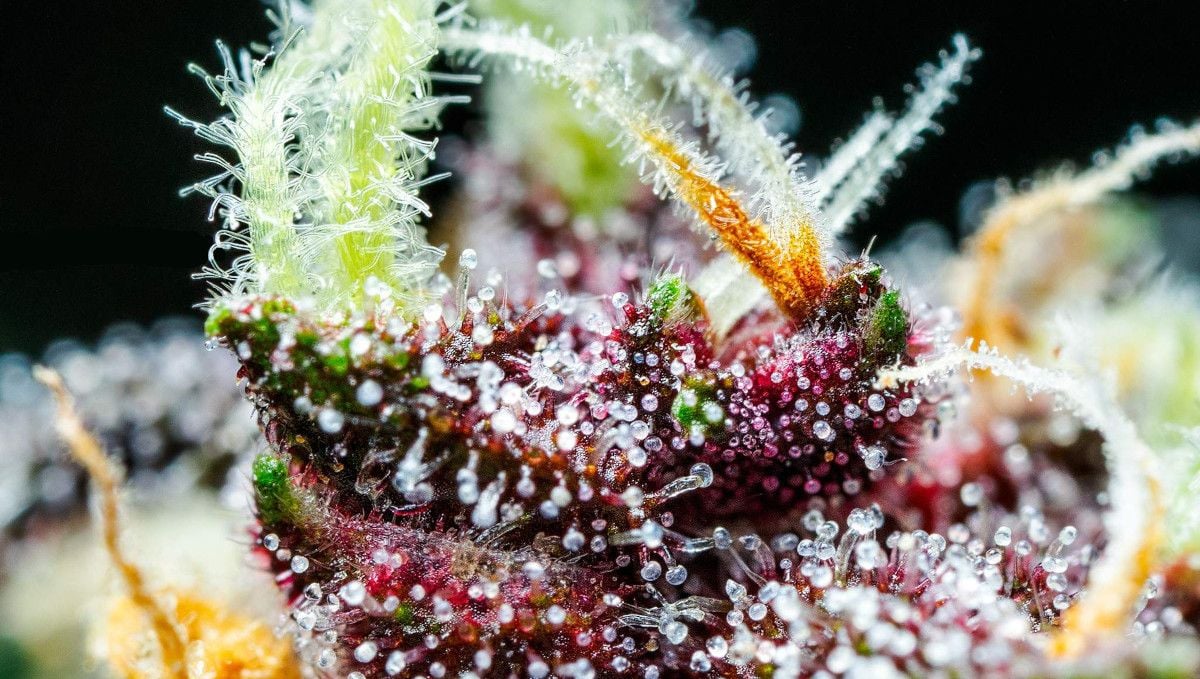
However, before the day of the harvest comes, there's one more important thing that you need to do if you want to get top-shelf bud in your home garden -- it's flushing the root zone of built up salts. The final flush takes up to 2 weeks in soil grows and helps to cleanse the plant's tissues, ensuring its clean and rich aroma and taste. There are a lot of flushing products on the market, but simply giving your plants pure water works just as well.
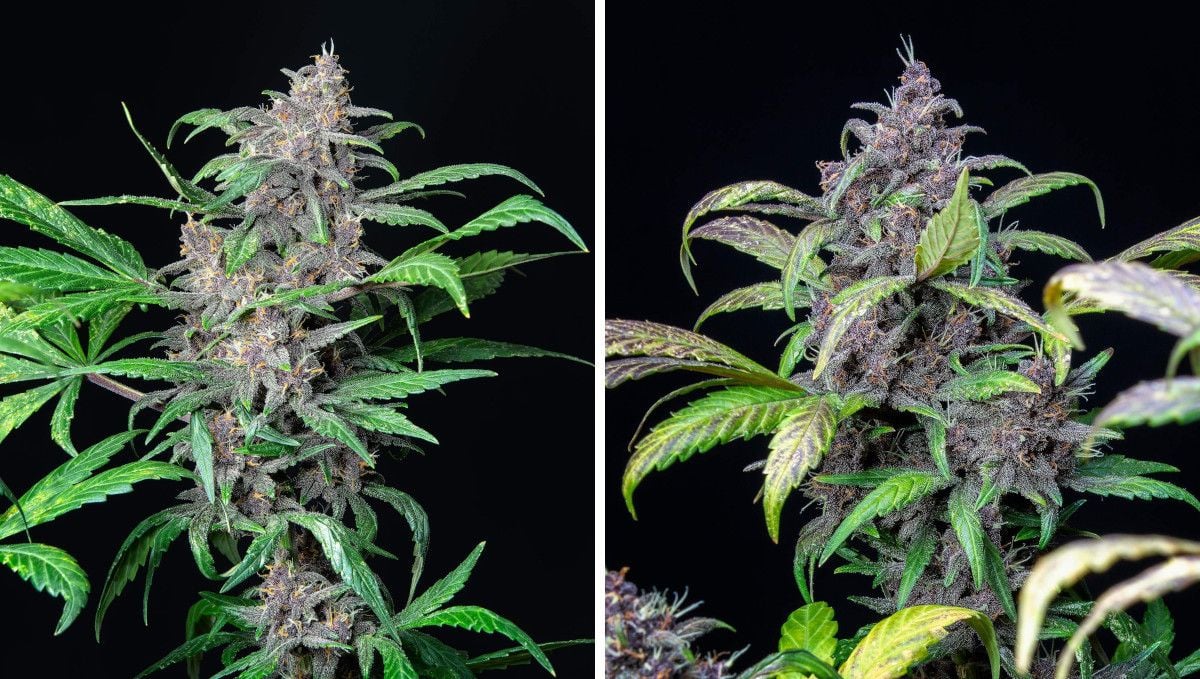
Of course, after you have finally cut down your plant, the consumption process doesn't start right away. Well, you may want to try some bud as a tester, but give the rest a long drying for 7-10 days in a dark, cool, well-ventilated room and then cure the buds in glass Mason jars for another 2-3 weeks at least. You'll notice the difference in the smoke right away.
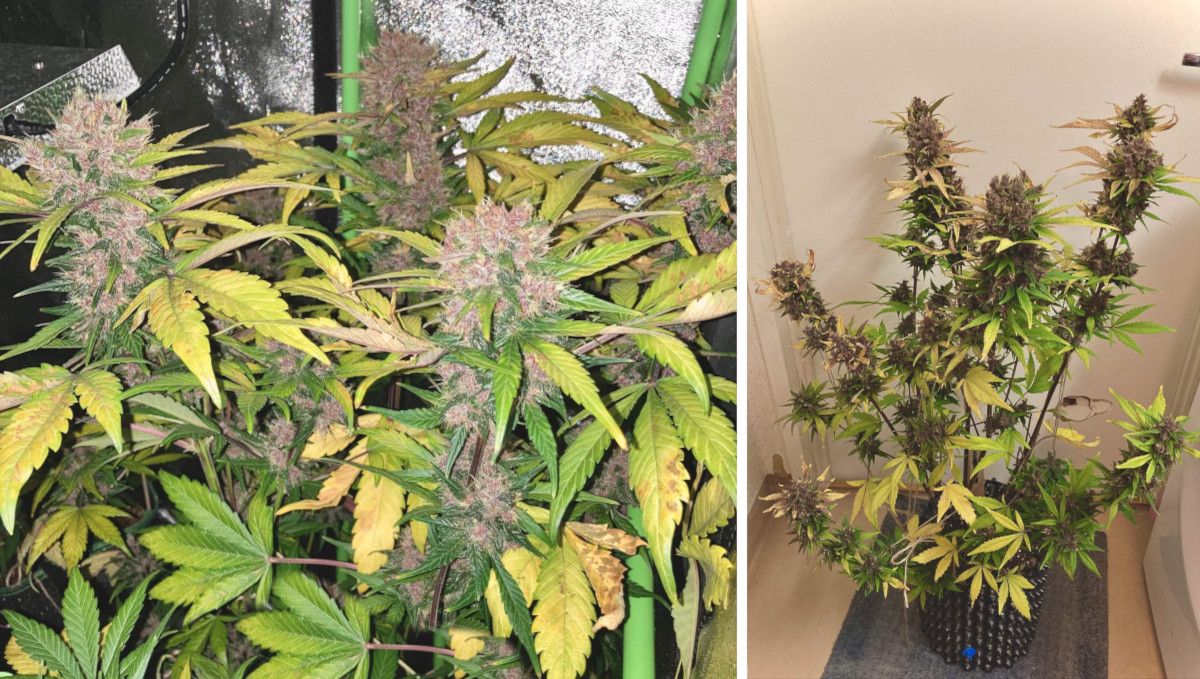
10. Yield and Smoke Report
Although both Auto Blackberry Kush plants whose progress we've been following weren't big, they produced admirably. The first grower got 120g (4.23 oz) of well-size and dense buds.
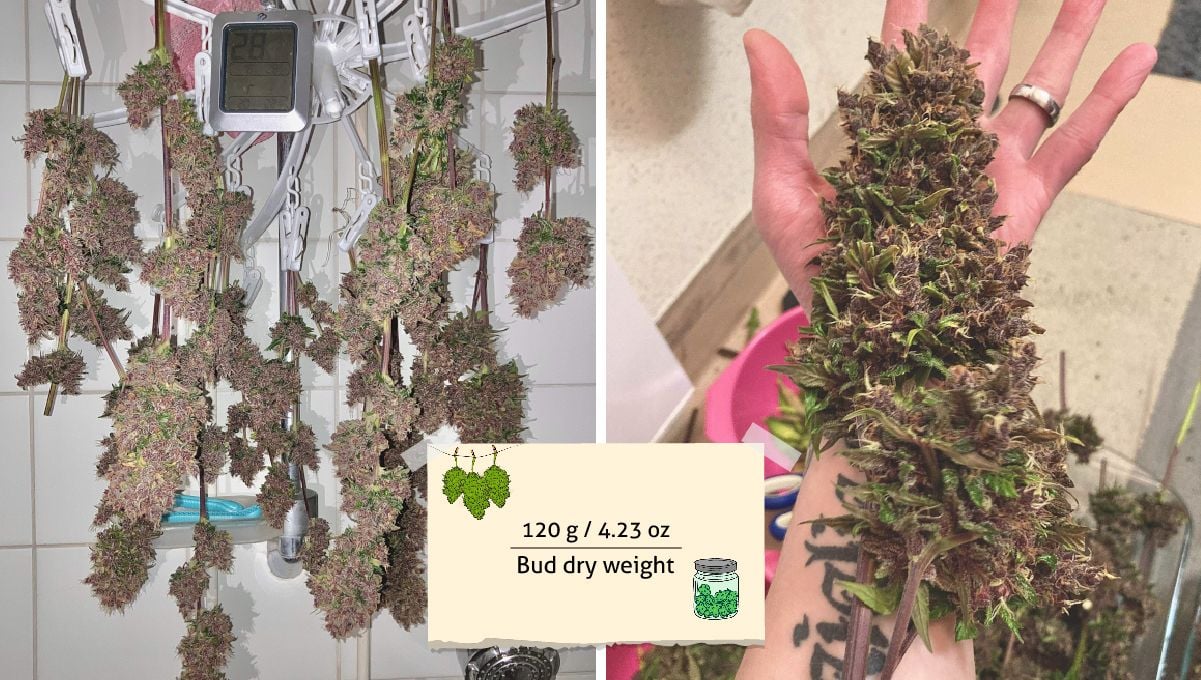
The other one harvested even more -- 140g (4.94 oz), and the buds were not only big and super dense but also had a deep-purple color, ensuring them a top-notch bag appeal.
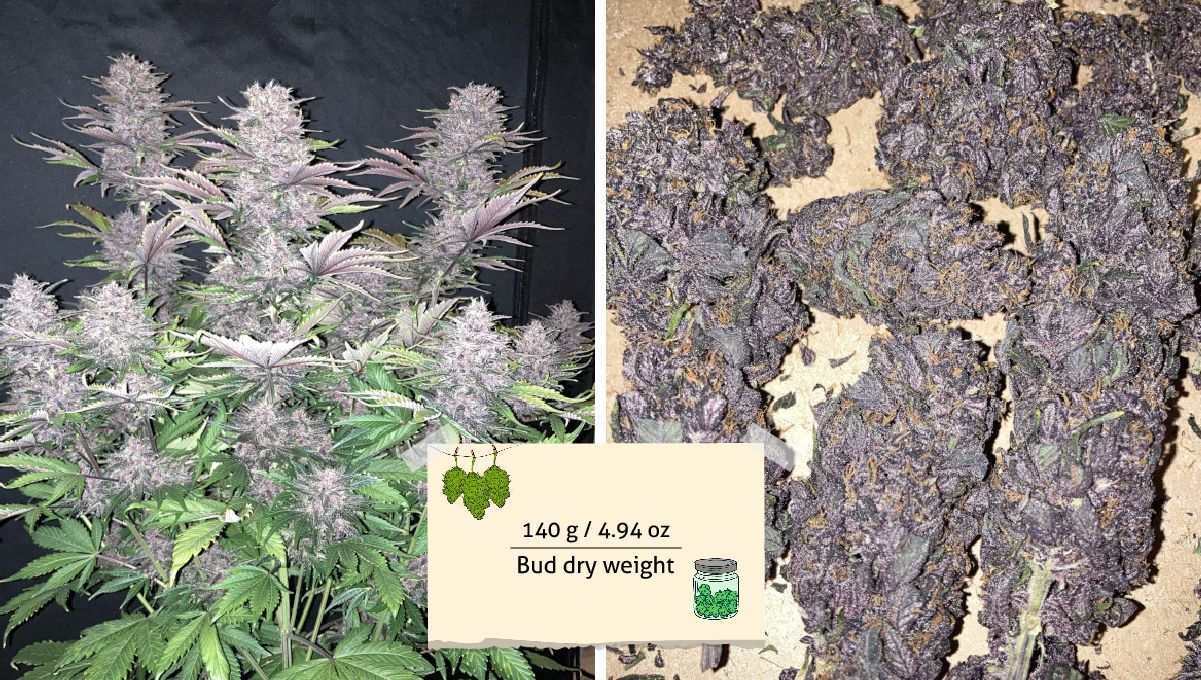
Auto Blackberry Kush offers a potent and flavorful experience, with a common theme among user reviews. Most users agree on its heavy indica effects, making it suitable for evening and bedtime use. The strain's flavor and aroma are a highlight, featuring a delightful mix of sweet blueberry and berry notes, often accompanied by hints of diesel, pine, and earthiness. Users commonly report feeling relaxed and happy, with a notable head buzz in the beginning that transitions into a heavier body stone. Some note an initial psychoactive aspect, while others describe a fairly uplifting and clear stone. Overall, Auto Blackberry Kush is praised for its smooth smoke, delicious taste, and suitability for relaxation and sleep.
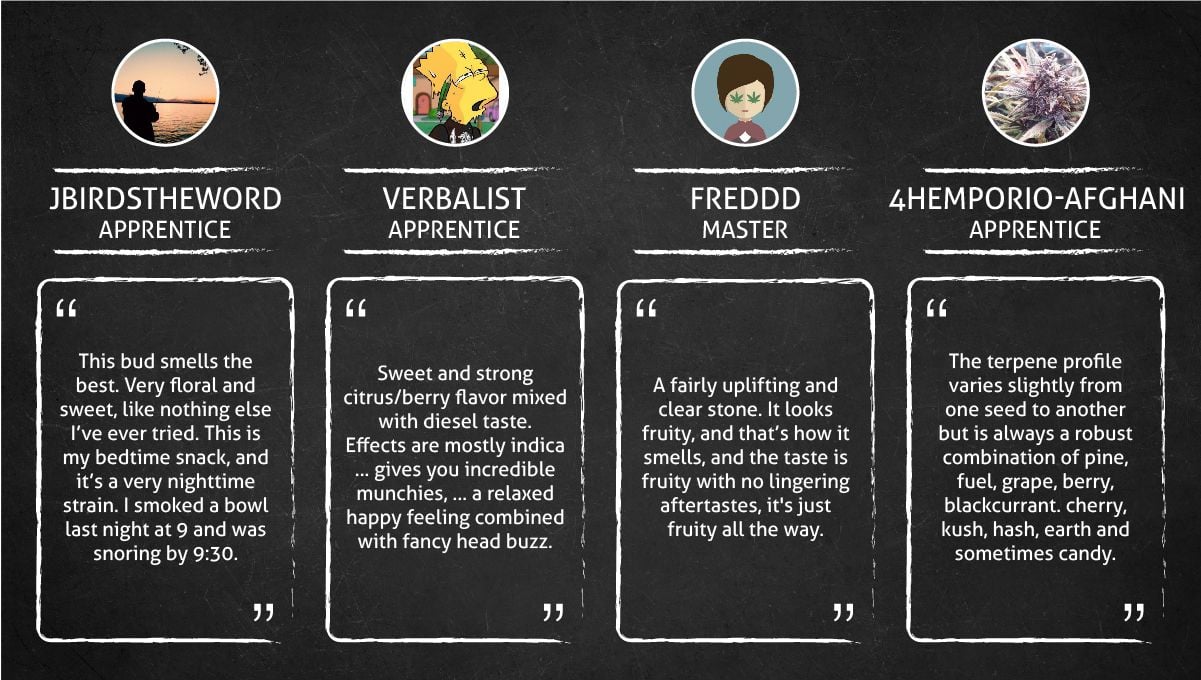
11. In Conclusion
As you have probably guessed from the grow diaries that we've been following in our Auto Blackberry Kush week-by-week guide, this strain is something much more than a great smoke. It's also an easy to grow plant that fits comfortably into small growing spaces, finishes fast, and brings in respectable yields of buds with an amazing bag appeal. In none of the grows, this autoflower got very big, and it didn't even need any training! Also, it's tendency to get purple by harvest is very consistent -- all of the plants got a great deep coloration without any extra hassle of lowering the temperature. So, it's a great choice for the lovers of purple buds! The smoke isn't likely to disappoint you either. To recap Auto Blackberry Kush is a great strain both for the cultivation and consumption. Happy growing, everyone!











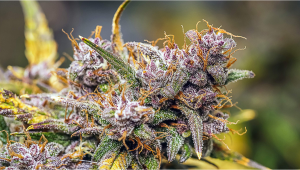

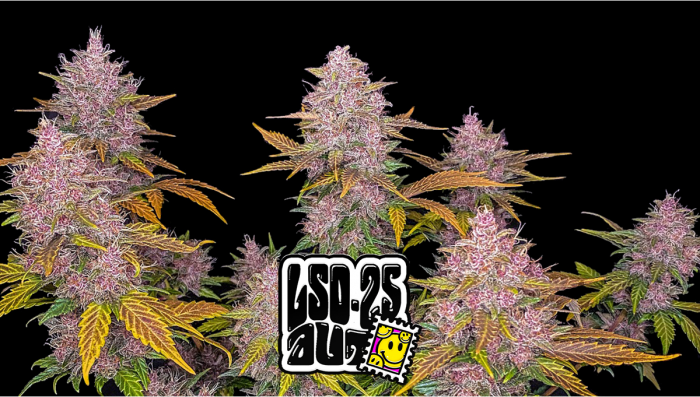
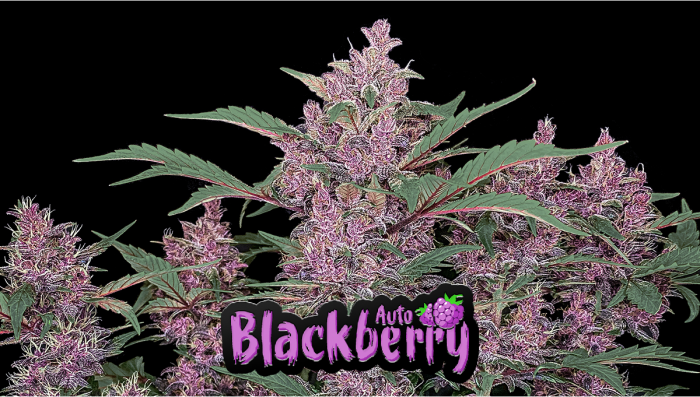
Comments